- Top Employee Onboarding Software
- Why Use Employee Onboarding Software?
- Key Features of Effective Onboarding Software
- How To Choose The Right Onboarding Software?
- Which is the Best Onboarding Software?
- Frequently Asked Questions (FAQs)
- What Is Upskill And Reskill?
- Difference Between Reskilling And Upskilling
- Upskilling for Workplace Advancement
- Reskilling for Career Transformation
- Crafting Successful Upskill and Reskill Strategies
- Upskill And Reskill Strategizing: Things to Keep in Mind
- Measuring the Impact of Skill Development Initiatives
- Frequently Asked Questions
- What’s a Skill Gap?
- Employee Skill Gap Analysis: Why Do We Need It?
- How To Conduct Employee Skill Gap Analysis?
- Addressing Skill Gaps Through Training and Hiring
- Utilizing Skills Gap Analysis for Strategic Planning
- Leveraging Employee Skill Gap Analysis: Things To Keep In Mind
- Frequently Asked Questions
- Transformative Role of AI in Talent Acquisition
- Impact of AI on Business Recruiting
- Overcoming Challenges in AI-Driven Talent Acquisition
- Starting with AI in Talent Acquisition
- Future Landscape of AI in Talent Acquisition
- Frequently Asked Questions
- HR In The Hot Seat - Challenges With Evolving Workforce
- Mastering Effective HR Management: Tips For Overcoming Challenges
- Summing Up
- The Future of HR: Key Trends for 2024
- Skill-Based Hiring
- Prioritizing Employee Experience, Engagement & Well-being
- AI-Empowered Workforce Evolution and Its Impact
- Taking Diversity, Equity, and Inclusion Beyond Mandates
- Hybrid and Remote Work
- Embracing the Gig Economy and Blended Workforce
- Transparent HR Practices
- Climate Change Adaptation in HR Practices
- Leveraging HR Analytics for Data-Driven Decisions
- Continuous Learning & Development to Improve Productivity
- The Office Buzz in 2024
- Bottom Line - HR Operating Model Needs A Shift
- Importance and Impact of Recognizing Employee Birthdays
- Professional Birthday Wishes for Employees (All Experience Levels)
- Personalized Birthday Wishes for Employees in Different Roles
- Fun Birthday Wishes for Employees (with Templates)
- Birthday Wishes for Remote Employees
- Heartfelt Birthday Wishes for Employees
- Belated Birthday Wishes for Employees
- Simple & Sweet Birthday Wishes for Employees
- Celebrating Employee Birthdays: Ideas and Traditions
- Tips and Ideas for Sending Birthday Wishes to Employees
- Closing Thoughts
- Frequently Asked Questions
- What Is An Employee Referral?
- Benefits of Implementing Employee Referral Programs
- Setting Up an Effective Employee Referral Program
- Employee Referral Email
- Employee Referral Scheme
- Overcoming Challenges of Employee Referrals
- Companies with Best Employee Referral Programs
- Employee Referral Programs: Best Practices
- Closing Thoughts
- Frequently Asked Questions (FAQs)
- Importance of Team Building Activities
- Types of Team Building Activities
- Outdoor Team Building Activities for Employees
- Indoor Team Building Activities for Employees
- Easy Team Building Activities for Remote Employees
- Team Building Activities For New Employees (Icebreakers)
- Fun Team Building Activities for Different Goals
- To Boost Communication and Collaboration
- To Reduce Stress Levels and Promote Well-being
- Aligning Team Purpose and Values with Strategic Activities
- Final Remarks
- Frequently Asked Questions
- Importance of Employee Appreciation Quotes
- Work Appreciation Quotes for Employees
- Employee Appreciation Quotes for Hard Work Recognition
- Employee Appreciation Quotes for Teamwork and Collaboration
- Appreciation Quotes for Celebrating Employee Anniversaries and Milestones
- Employee Appreciation Quotes for Strong Work Ethics
- Employee Appreciation Quotes for Project & Goal Completion
- Employee Appreciation Quotes for Quality of Work
- Employee Appreciation Quotes for Creativity and Innovation
- Appreciation Quotes for Managers
- Peer-to-Peer Employee Appreciation Quotes
- Appreciation Quotes for Employees Leaving the Company
- Employee Appreciation Quotes for Thoughtful Gestures
- Funny Employee Appreciation Quotes
- Short Employee Appreciation Quotes
- Employee Appreciation Quotes for Different Roles
- Employee Appreciation Quotes for Senior Leadership
- Creative Ways to Use Employee Appreciation Quotes
- Summary
- Frequently Asked Questions (FAQs)
- What is Employee Satisfaction?
- Importance of Employee Satisfaction
- Objectives of Employee Satisfaction
- Employee Satisfaction vs. Employee Engagement
- Key Reasons for Employee Dissatisfaction
- Strategies for Improving Employee Satisfaction
- Ways to Measure Employee Satisfaction
- Best Practices for High Employee Satisfaction
- Final Remarks
- Frequently Asked Questions (FAQs)
- How to Craft Effective Employee Appraisal Comments
- Key Areas to Focus in Performance Review
- Comments On Hard Work & Dedication
- Assessing Interpersonal Skills
- Evaluating the Ability to Collaborate & Work in Teams
- Gauging Punctuality
- Commenting on Communication Style
- Reviewing Time Management and Productivity
- Leadership in Performance Appraisals
- Assessing Creativity & Innovation
- Evaluating Problem-Solving Abilities
- Recognizing Flexibility and Dependability in Reviews
- Employee Appraisal Comments for Different Roles
- Summary
- Frequently Asked Questions (FAQs)
- Employee Grievance Meaning
- Importance of Employee Grievance Process
- Types of Workplace Grievances
- Reasons for Employee Grievances
- Employee Grievance Procedure
- Steps in the Employee Grievance Handling Process
- Employee Grievance Form Example
- Final Remarks
- Frequently Asked Questions (FAQs)
- What is Company Culture?
- Importance of Company Culture
- Types of Company Culture
- Factors Contributing to Organizational Culture
- Assessing & Developing Corporate Culture
- Company Culture - It’s not just Perks or Feels
- Good Company Culture Examples
- Developing Company Culture: Best Practices
- Closing Thoughts
- Frequently Asked Questions (FAQs)
- What is Employee Empowerment?
- Benefits of Empowering Employees
- Employee Empowerment vs. Micromanagement
- Strategies for Effective Employee Empowerment
- Role of Managers in Fostering Empowerment
- Organizational Structure Supporting Empowerment
- Overcoming Barriers to Employee Empowerment
- Frequently Asked Questions (FAQs)
- What is Employer Branding?
- Importance of Employer Branding Strategy
- How to Build an Employer Branding Strategy?
- Strategies for Building a Strong Employer Brand
- How to Measure and Boost Your Employer Branding Success?
- Examples of Strong Employer Brand Strategy
- Best Practices for an Effective Employer Branding Strategy
- Closing Thoughts
- Frequently Asked Questions (FAQs)
- What are Employee Wellness Programs?
- Importance of Employee Wellness Programs
- Examples of Employee Wellness Programs
- Real-Life Examples of Corporate Wellness Programs
- Strategies for Encouraging Participation
- Supporting Diverse Employee Needs
- Creating Comprehensive Wellness Programs
- Measuring the Impact on Business and Employees
- Closing Thoughts
- Frequently Asked Questions (FAQs)
- What is Talent Management?
- Developing a Winning Talent Management Strategy
- Models and Frameworks
- Tips for Framing Effective Talent Management Strategy
- Looking Ahead: Recent Trends in Talent Management
- Frequently Asked Questions
- Role of AI in HR: Addressing Common Challenges
- Artificial Intelligence in HR Processes
- AI Tools for HR Functions
- How to Adopt AI in HR?
- Addressing Challenges of AI in HR
- Ethical and Responsible AI Use
- The Future of AI in HR
- Closing Thoughts
- Frequently Asked Questions
- What is Performance Management?
- Elements of Effective Performance Management
- Performance Management Cycle
- Differentiating Performance Management
- Benefits of Performance Management With Examples
- Challenges faced in Performance Management and their Solutions
- Future Trends in Performance Management
- Frequently Asked Questions
- Changing Role of HRM
- Changing Role Of HR Manager
- Technology and the Changing Role of HRM
- The Rise of AI and Machine Learning in HR
- Mobile Technology's Impact on HR Practices
- The Significance of People Analytics in HR
- Navigating the Future of HR Technology
- Final Remarks
- Frequently Asked Questions
- Compensation Management Meaning
- Compensation Types
- Breaking Down The Compensation Management Process
- HR Software for Compensation Management
- Current Trends in Compensation Management
- Frequently Asked Questions
- Defining Flexible Work Arrangements
- Flexible Working: Advantages for Businesses
- Challenges of Flexible Work Arrangements
- Crafting Flexible Working Practices
- Types Of Flexible Work Arrangements
- Comparing Flexible Work Arrangements
- Real-Life Examples of Flexible Work Arrangements
- Final Remarks
- Frequently Asked Questions
- Conflict Resolution Meaning
- Conflict Origins
- Tried & Tested Conflict Resolution Strategies
- Methods of Conflict Management at Workplaces
- Conflict Resolution Strategies: Top Management Tips
- Summary
- Frequently Asked Questions
- Career Development Meaning
- Career Development Plan for Employees
- Career Development in HRM: Growth Ideas For Employees
- Issues in Career Development and Their Solutions
- Closing Thoughts
- Frequently Asked Questions
- Understanding Compensation
- Exploring Benefits
- Difference between Compensation and Benefits
- Compensation & Benefits Structure
- Final Remarks
- Frequently Asked Questions
- Defining Recruitment in HR Practices
- Exploring Talent Acquisition in HR
- Understanding Talent Acquisition vs Recruitment
- When to Recruit or Acquire Talent
- Talent Acquisition vs Recruitment: Responsibilities
- From Recruitment To Talent Acquisition
- Closing Thoughts
- Frequently Asked Questions
- Work Culture Meaning
- Types of Work Cultures
- Components of Culture
- Best Work Culture Examples Set By Top Companies
- Creating a Positive Work Culture
- Closing Thoughts
- Frequently Asked Questions
- Defining Learning vs Development
- Importance of Learning and Development
- L&D Activities for Employees
- Choosing the Right L&D Activities
- Crafting an Effective L&D Strategies
- Aligning L&D Strategy with Business Goals
- Designing Engaging Learning Journeys
- Learning and Development Process: KPIs
- ROI in Learning and Development
- Emerging Trends in L&D
- Closing Thoughts
- Frequently Asked Questions
- What Is Leadership Development?
- Key Skills for Leaders
- How To Develop Leadership Skills in Organizations?
- What Is A Leadership Development Program?
- How To Develop A Leadership Development Program?
- Example of A Leadership Development Plan
- Benefits of Leadership Development Training
- Frequently Asked Questions
- Defining Diversity Training
- Importance of Diversity Training
- What are the Types of Diversity?
- Types of Diversity Training Methods
- Diversity Training Activities
- Choosing A Diversity Training Program
- How to Implement Diversity Initiatives
- Best Diversity Training Programs (Real-Life Examples)
- Improving the Effectiveness of Diversity Training
- Tracking and Evaluating the Results of DE&I Training Efforts
- Essential Elements for Successful Diversity Training
- Closing Thoughts
- Frequently Asked Questions
- Defining Occupational Health & Safety
- Evolution of Workplace Health and Safety
- Identifying Common Workplace Hazards
- Global Impact on Occupational Health & Safety
- Managing Employee Health and Safety Risks
- Occupational Health and Safety Problems
- Future of Occupational Health and Safety
- Frequently Asked Questions
- Employee Orientation Defined
- Employee Onboarding Explained
- Orientation and Onboarding: Understanding the Difference
- Importance of Orientation and Onboarding
- Crafting Comprehensive Integration Strategies
- Quick Tips for Orientation and Onboarding
- Frequently Asked Questions
- What is HR Metrics?
- Importance of HR Metrics
- HR Metrics Examples in Recruitment
- HR Metrics Examples in Employee Retention
- HR Metrics Examples in Revenue
- Other Common HR Metrics
- Soft HR Metrics Example
- HR Metrics Formula
- Utilizing HR Metrics Effectively
- Future of HR Metrics
- Summary
- Frequently Asked Questions
- Defining Decision Making Process
- Key Concepts In Decision Making
- Decision Making & Problem Solving
- Tips For Improving Decision Making Skills
- Selected Practice Questions & Answers
- Conclusion
- Frequently Asked Questions (FAQs)
- A case(s) of miscommunication
- The devil is in the (resume) details
- One for the complaints!
- What is an Exit Interview?
- Benefits of Exit Interviews to an Organization
- How to Conduct Exit Interviews?
- Exit Interview: Sample Questions to Ask
- Overcoming Challenges of Exit Interviews
- Exit Interviews: Best Practices
- Closing Thoughts
- Frequently Asked Questions
- Technology in the Workplace
- Benefits of Tech Integration
- Technology in the Workplace: Key Functions
- How Technology Normalized Remote Work
- Workplace Technology: Top Tools and Software
- Steps for Effective Technology Implementation
- Overcoming Tech Implementation Challenges
- Ethical Considerations in Tech Use
- Keeping Pace with Tech Trends
- Closing Thoughts
- Frequently Asked Questions
- What is Ethical Leadership?
- Principles of Ethical Leadership
- Difference between Ethics and Integrity
- Importance of Ethical Leadership
- Ethical Leadership in Practice
- Overcoming Challenges
- Frequently Asked Questions
- Embracing Change Management
- Mastering People Analytics
- Enhancing Stakeholder Relationships
- Navigating Diversity, Equity & Inclusion
- Upholding Ethics and Data Privacy
- Developing Critical Thinking
- Advancing Negotiation Techniques
- Fostering Inter-departmental Collaboration
- Building Resilience in HR
- Frequently Asked Questions
- What is Mental Health?
- Benefits of a Mentally Healthy Workforce
- Prioritising Mental Health: Creating a Culture of Support
- Final Remarks
- Frequently Asked Questions
- Gen Z vs Millennials - What is the difference?
- Retain and Engage Gen Z Employees: Need and Strategies
- Strategies to Retain and Engage Gen Z Employees
- Rethinking Requirements
- Final Remarks
- Frequently Asked Questions
- Understanding Millennial Leadership Needs
- Key Leadership Skills for Millennials
- How To Develop Millennial Into Leaders
- Additional Strategies to Develop Leaders
- Learning Preferences of Millennials
- Benefits of Investing in Millennial Leaders
- Closing Thoughts
- Frequently Asked Questions
- Understanding Fluff
- Examples of Interview Fluff
- Identifying Interview Fluff
- Addressing Interview Fluff
- Seeing Through the Fluff
- Frequently Asked Questions
- What is the Gender Pay Gap?
- Is the Gender Pay Gap Real?
- Factors Affecting the Gender Pay Gap
- How Age Impacts Women’s Earnings
- The ‘Motherhood Penalty’
- Education's Role in Wage Differences
- Racial and Ethnic Disparities in Pay
- Closing the Gender Gap
- Frequently Asked Questions
- Top Weirdest Late-To-The-Office Excuses
- The Fine Art of Balancing Wit and Wisdom in HR
- Understanding Social Media Recruiting
- Crafting Your Social Media Recruitment Strategy
- Implementing Your Strategy Effectively
- Popular Platforms for Recruitment
- Navigating the Downsides of Social Media Recruiting
- Measuring Success and Adjusting Strategy
- Summary
- Frequently Asked Questions
- Who Is A High Potential (HIPO) Employee?
- Characteristics of A High Potential (HIPO) Employee
- High Potential Employee Identification
- Grooming High Potential Employees
- Why High Potential Employees Leave
- How Do You Retain High Potential Employees?
- High Potential Employee Development: Best Practices
- Closing Thoughts
- Frequently Asked Questions
- What is Digital Fluency?
- Why Digital Fluency Matters?
- Difference between Digital Literacy and Digital Fluency
- Key Components of Digital Fluency
- Achieving Digital Fluency
- Overcoming Challenges
- Future of Workforce Digital Fluency
- Frequently Asked Questions
- What is Loud Quitting?
- Pros and Cons of Loud Quitting
- Reasons Behind the Trend
- Analyzing the Impact
- How HR Can Navigate the Loud Quitting Uproar
- Preventive Strategies
- Closing Thoughts
- Frequently Asked Questions
- Defining Emotional Intelligence in HR
- Why Emotional Intelligence Matters for HR Leaders
- How To Build Emotional Intelligence in HR
- Integrating EQ into HR Practices
- Impact of EQ on Company Culture
- Emotional Intelligence in HR: Major Challenges
- Final Remarks
- Frequently Asked Questions
- Understanding Internal Job Posting
- Internal Job Posting: Pros and Cons
- The Internal Job Posting Process
- Writing Effective Ads for Internal Job Posting
- Strategies for Success of Internal Job Posting
- Summary
- Frequently Asked Questions
- Understanding Workplace Bias
- Common Types of Bias in HR
- Closing Thoughts
- Frequently Asked Questions
- What is a Dry Promotion?
- Dry Promotion: Pros and Cons for Companies
- Impact of Dry Promotion on Employee Retention
- Preventing Talent Loss After Dry Promotions
- Closing Thoughts
- Frequently Asked Questions
- What Is A Stay Interview?
- Importance Of Stay Interviews
- Benefits And Challenges Of Stay Interviews
- Planning And Conducting Stay Interviews
- Stay Interviews: 20 Sample Questions To Ask
- Best Practices For Effective Stay Interviews
- Summary
- Frequently Asked Questions
- Who Is A Boomerang Employee?
- Reasons For Returning
- Benefits Of Hiring Boomerang Employees
- Challenges Of Rehiring
- Interviewing Boomerang Candidates: Sample Questions
- Enhancing The Hiring Process
- Making Informed Decisions
- Final Remarks
- Frequently Asked Questions
- Talent Pipeline Meaning
- Significance of Talent Pipelines
- Advantages of a Talent Pipeline
- Building a Talent Pipeline
- Maintaining a Talent Pipeline
- Attracting Top Talent
- Implementing the Strategy
- Frequently Asked Questions
- What is Micromanagement?
- Recognizing Micromanagement
- Leadership versus Micromanagement
- Keeping Micromanagement in Check
- Beyond Micromanagement
- Summing Up
- Frequently Asked Questions
- Recognizing Signs Of A Bad Hire
- Understanding The Impact On Teams
- Dealing With A Bad Hire
- Preventing Future Bad Hires
- Closing Thoughts
- Frequently Asked Questions
- Defining Neurodiversity
- Importance of Neurodiversity in the Workplace
- Moving Towards Inclusive Environments
- Final Remarks
- Frequently Asked Questions
- Understanding the Generation Gap
- Multigenerational Workforce: Debunking Stereotypes
- Strategies for Bridging the Gap
- Benefits of a Multigenerational Workforce
- Final Remarks
- Frequently Asked Questions
- Defining Productivity Theatre: All Show, No Go
- 5 Key Drivers of Fake Productivity
- Solutions to Combat Productivity Theatre
- Summary
- Frequently Asked Questions
- Defining Grumpy Staying
- Why do Grumpy Stayers not Leave?
- Recognizing the Signs
- Exploring the Causes
- Understanding the Impact
- Addressing the Issue
- Taking Action: Addressing Grumpiness with Empathy
- After the Conversation
- When Grumpy Staying Continues
- Closing Thoughts
- Frequently Asked Questions
- The Rationale Behind Office Peacocking
- Impact on Company Culture
- Impact on Employees
- Case Studies: Examples of Office Peacocking
- The Downside: Potential Pitfalls of Office Peacocking
- Practical Tips for Implementing Office Peacocking
- Frequently Asked Questions
- 13 Common Mistakes Young Managers Make
- Strategies To Avoid Mistakes (Individual Growth)
- How Young Managers Can Boost Teamwork
- Learning From Errors
- Summary
- Frequently Asked Questions
- Understanding Great Regret - What causes the shift shock?
- Impact of Great Regret
- How can HR help make the situation better?
- Closing Thoughts
- Frequently Asked Questions
- Understanding the HR Budget
- Key Components of an HR Budget
- Preparing an HR Budget Step-by-Step
- Importance of HR Budgeting in Management
- Final Remarks
- Frequently Asked Questions
- What are Pre-Employment Assessments?
- Importance of Pre-Employment Testing
- Types of Pre-Employment Assessments
- 15 Tips for Creating Effective Pre-Employment Assessments
- Closing Thoughts
- Frequently Asked Questions
- Exploring the Productivity Paradox
- Understanding the Impact of Solow Paradox
- Productivity Paradox: Why it Matters for Recruiters & HRs
- Identifying Causes and Challenges
- Strategies for Enhancing Productivity
- AI & the Modern-Day Productivity Paradox
- Beyond Technology: Building a Productive Workforce
- Summary
- Frequently Asked Questions
- Understanding the Great Reshuffle 2.0
- Preparing Leaders for the Change
- HR’s Role in Handling Great Reshuffling 2.0
- The Way Ahead
- Frequently Asked Questions
- Definition Of Managerial Grid
- Managerial Grid Theory Explained
- Application Of Managerial Grid
- Criticisms And Limitations
- Evolution And Contemporary Perspectives
- Integrating Managerial Grid With Other Models
- Practical Steps For Implementing Managerial Grid
- Conclusion
- Frequently Asked Questions
- Understanding Skills Taxonomy
- Why do we Need Skills Taxonomy?
- Benefits of Skills Taxonomy
- Components of Skills Taxonomy
- Building a Skills Taxonomy: A Step-by-Step Guide
- Skill Taxonomies vs Intelligence Tools
- Closing Thoughts
- Frequently Asked Questions
- Definition Of Team Building
- Stages Of Team Development
- Top 10 Strategies For Effective Team Building
- Team Building Activities
- Best Practices For Effective Team Building
- Setting Team Building Objectives
- Challenges In Team Building
- Conclusion
- Frequently Asked Questions (FAQs)
- Defining Job Shadowing
- Unpacking the Benefits
- Setting Up the Experience
- Job Shadowing vs Internship
- Dos and Don'ts for HR Professionals
- Closing Thoughts
- Frequently Asked Questions
- Employee Journey Mapping: Meaning & Importance
- Stages of the Employee Journey
- Steps for Effective Mapping
- Employee Journey Map: Where does it begin?
- Employee Journey Map: Template
- Best Practices & Tips
- Summary
- Frequently Asked Questions
- Why are Performance Appraisals needed?
- Evolution of Performance Management
- Modern Performance Practices
- Benefits of Modern Performance Appraisals
- The Future
- Frequently Asked Questions
- Is Experience the Sole Indicator of Success?
- Why Hire Inexperienced Talent?: Key Advantages
- Skills to Look For in Inexperienced Talent
- Challenges and Considerations in Hiring Inexperienced Talent
- Final Remarks
- Frequently Asked Questions
- What is a Company Retreat?
- Company Retreat Ideas: Team-Building & Exploration
- Relaxation and Celebration
- Planning Your Retreat: Things to Keep in Mind
- Closing Thoughts
- Frequently Asked Questions
- Understanding HR Forecasting
- HR Forecasting Key Concepts
- Steps for Implementing HR Forecasting
- Common HR Forecasting Methods
- Closing Thoughts
- Frequently Asked Questions
- What is ESG?
- HR and ESG - Why Care?
- ESG in HR Strategy
- Challenges for HR
- Future of ESG in HR
- Frequently Asked Questions
- Defining the Great Betrayal
- Reasons for Its Spread
- Impact on Workers
- Impact on Corporations
- Rebuilding Trust & Valuing Employees
- Closing Thoughts
- Frequently Asked Questions
- Importance of Clear Expectations
- Setting Expectations Early
- Communicating Expectations Effectively
- Differentiating Expectations
- Reviewing and Adjusting Expectations
- Summing Up
- Frequently Asked Questions
- Understanding KRA Frameworks And Models
- KRAs vs KPAs and KPIs
- Monitoring and Tracking KRAs
- KRAs in Various Roles
- Impact of KRA Frameworks and Models on Organizational Success
- Frequently Asked Questions
- Where: The Place of Work
- When: The Time of Work
- How Much Work: Alternate Employment Models
- Who Does the Work: Intelligence
- Designing Organizations with the Four Dimensions of Work
- Summing Up
- Simplifying Processes: The Foundation of Efficiency
- Reducing Unnecessary Meetings: Reclaiming Valuable Time
- Building Strong Accountabilities: Ensuring Responsibility
- Role of HR in Addressing Inefficiencies
- Continuous Improvement: A Commitment to Excellence
- Leadership's Role in Driving Efficiency
- Conclusion: A Holistic Approach to Efficiency
- Understanding Financial Freedom
- Benefits of Empowering Employees Financially
- Empowering Employees Through Financial Literacy
- Financial Topics That Need Attention Based On Career Stage
- Summing Up
- Frequently Asked Questions
- Defining Employee Voice
- Benefits of Amplifying Employee Voice
- Strategies and Tools
- Encouraging Participation
- Closing Thoughts
- Frequently Asked Questions
- Appraisal Blues: Signs of Unhappy Employees
- Addressing Unhappiness Post-Appraisal
- Non-Monetary Solutions for Dissatisfied Employees
- Summing Up
- Frequently Asked Questions
- Women in the Middle Eastern Workforce
- Importance of DEIB
- Role of HR in Building Inclusive Workplaces for Women
- Measuring Inclusion Progress: Key Metrics
- Closing Thoughts
- Frequently Asked Questions
- Preparing for the Conversation
- Conducting the Conversation
- Best Practices for the Talk
- After the Conversation
- Helping Employees Grow
- Frequently Asked Questions
- Understanding HR Exhaustion
- Factors Leading To HR burnout
- Impact Of HR Burnout
- Strategies To Prevent And Manage HR Burnout
- Role Of Technology In Preventing Burnout
- Celebrating HR Successes
- Summary
- Frequently Asked Questions
- Common Mistakes When Hiring Young Talent
- Building Connections with Candidates
- Summary
- Frequently Asked Questions
- Walking a mile in the employee’s shoes
- Conducting Humane Layoffs
- Remote Layoffs Management
- Supporting Laid-off Workers
- Managing the Aftermath
- Wrapping Up
- Frequently Asked Questions
- Importance of Shortening Time-to-Hire
- Shortening Hiring Time: Pre-Application Stage
- Reducing Hiring Time: Application Stage
- Hacks to Shorten Hiring Time: Interview Stage
- Reducing Hiring Time: Offer Stage
- 5 Other Important Hacks & Strategies
- Final Remarks
- Frequently Asked Questions
How To Develop Millennials Into Leaders: Key Strategies & Benefits
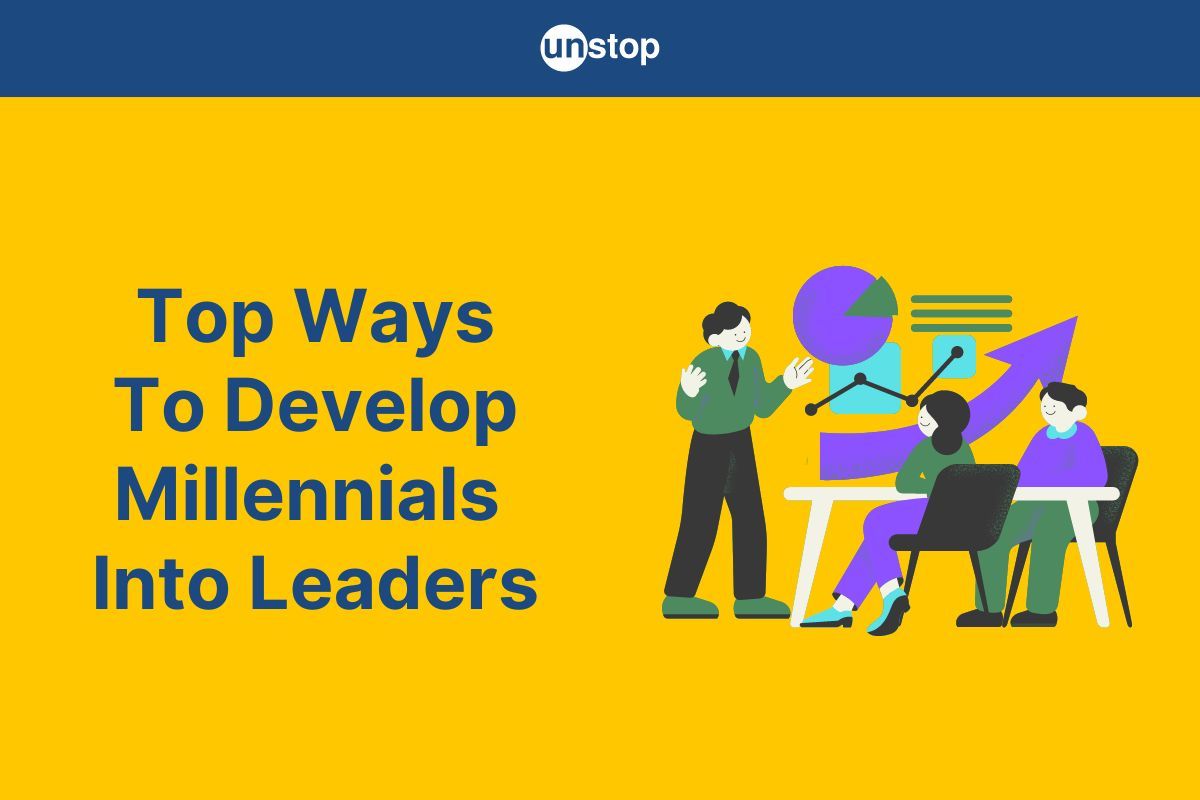
The question of how to develop millennials into leaders has never been as relevant as it is in the current business landscape, where millennials are poised to take over leadership roles from Baby Boomers and Gen X.
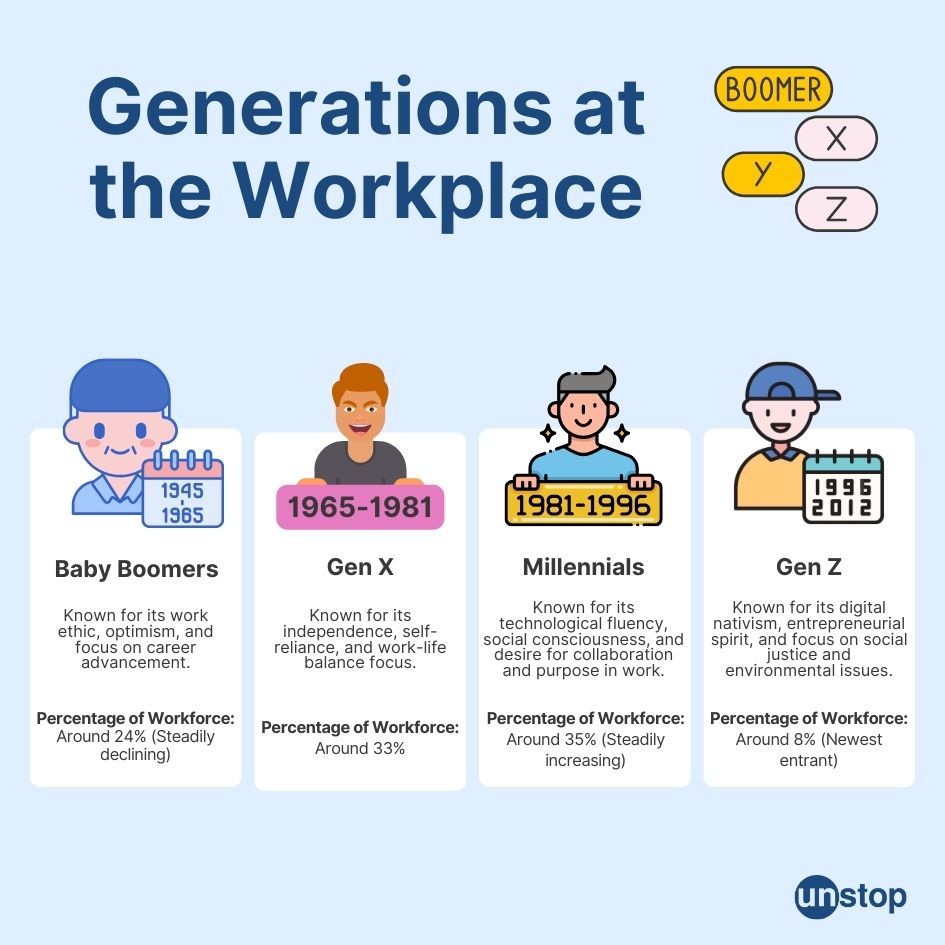
Millennials, the tech-savvy and diverse cohort born between 1981 and 1996, are reshaping the modern workforce. But, due to their work styles and priorities, developing them into effective leaders requires a fresh approach.
This article explores key strategies to bridge the generational gap between boomers and millennials in the workplace. By focusing on mentorship, fostering continuous learning, and building a culture of open communication, organizations can unlock the leadership potential within the millennial workforce.
Understanding Millennial Leadership Needs
What motivates millennials to work hard and take additional responsibility at the workplace? Is it the promise of better pay, the likelihood of corporate fame, or something else altogether?
Understanding millennial aspirations is crucial in developing a leadership development program for them:
- Aspirations & Career Goals: Millennials aspire to make a meaningful impact through work. They prioritize personal growth and development in their careers.
- Purpose-Driven Leadership: For millennials, leadership positions are not just about authority; they seek leadership roles that allow them to contribute to a larger purpose and drive positive change. To engage and retain young leaders, organizations must emphasize purpose-driven leadership, which focuses on positively impacting society.
- Alignment with Values & Beliefs: Millennials place significant importance on leadership roles that align with their beliefs and ethics. They are more likely to excel in positions where they can authentically express their values while leading others.
When developing millennial leaders, consider their preference for open communication and feedback. They value clear expectations when delegating tasks and appreciate being involved in the decision-making process.
Tailoring leadership development programs to reflect these preferences is key to nurturing millennial talent.
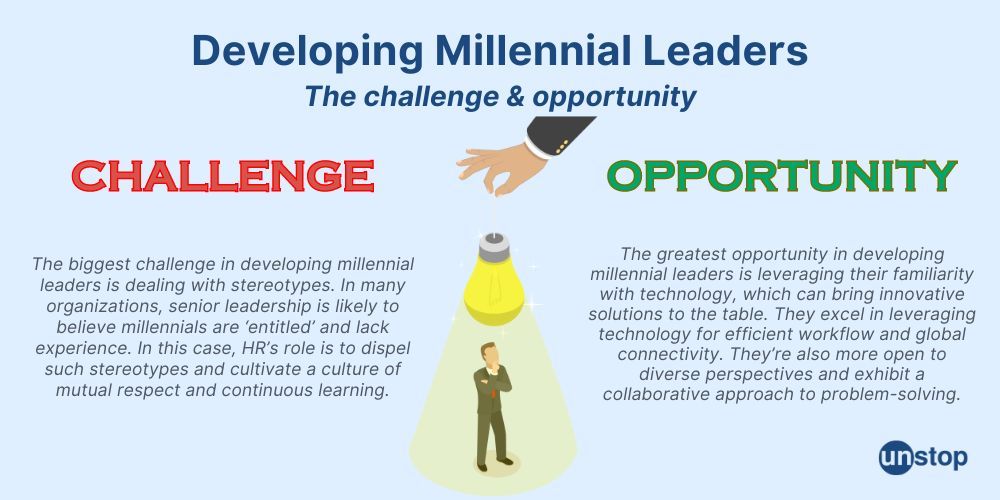

Key Leadership Skills for Millennials
Here are the key leadership qualities for millennials in the modern workplace:
- Communication & Collaboration: Millennials need to prioritize clear and transparent communication to lead effectively. They should also focus on fostering teamwork within their teams.
- Emotional Intelligence: Understanding and managing emotions, both their own and others, is crucial for millennial leaders. Developing empathy and self-awareness can enhance their leadership capabilities and help them navigate conflicts more effectively.
- Strategic Thinking & Problem-Solving: Millennials must be able to analyze complex situations, make informed decisions, and tackle challenges head-on. Developing critical thinking skills is essential for effective leadership.
- Agility & Adaptability: Today's workplace is constantly evolving. Millennial leaders need to be adaptable, think strategically, and make sound decisions in the face of change.
- Data-Driven Decision-Making: While valuing diverse perspectives, millennial leaders should also be comfortable using data and analytics to inform their decisions.
- Coaching, Mentoring & Providing Feedback: As leaders, millennials need to be able to guide and support team members for their growth and development. Regular and clear feedback allows leaders to guide and support employee development, helping them reach their full potential. And it helps employees understand their strengths and weaknesses, identify areas for improvement, and ultimately perform their jobs better.
- Time Management & Delegation: Leaders who manage their time effectively can ensure they have time to provide feedback, delegate tasks, and coach their team members for growth.
How To Develop Millennial Into Leaders
Here's a roadmap to bridge the generational gap and unlock the leadership potential within your millennial workforce:
1. Identify & Assess Leadership Potential
- Formal Assessments: Utilize leadership assessment tools to identify individuals who demonstrate core leadership qualities like initiative, problem-solving, and communication skills.
- Performance Reviews: Look for millennials who consistently exceed expectations, take ownership of projects, and inspire their colleagues.
- Peer Nominations: Encourage peer nominations to identify individuals who are seen as natural leaders within their teams.
2. Focus on Building Strong Relationships
- Mentorship Programs: Pair millennial leaders with experienced mentors who can provide guidance, support, and career advice.
- Reverse Mentoring: Consider a "reverse mentorship" program where millennials mentor senior leaders on new technologies, communication styles, or innovative approaches.
Did you know? Reverse mentoring is one of the eight types of mentoring. Read about the rest here.
- Open Communication: Foster a culture of open communication where millennials feel comfortable voicing their ideas, concerns, and suggestions. Promote transparent communication channels to address issues promptly and provide guidance.
3. Cultivate Key Leadership Skills
- Leadership Training Programs: Invest in leadership development programs specifically tailored to the needs of millennial leaders. These programs can focus on areas like communication, strategic thinking, coaching, and conflict resolution.
- Utilize Simulations & Learning Projects: Assign challenging projects or use simulations that allow millennials to apply leadership skills in real-world scenarios.
- Continuous Learning Opportunities: Encourage ongoing learning and development through workshops, conferences, or online courses relevant to leadership development.
4. Embrace Their Strengths & Preferences
- Collaboration & Teamwork: Millennials thrive in collaborative environments. Designate projects and tasks that leverage their teamwork skills and empower them to share ideas openly.
- Technology & Innovation: Millennials are digital natives. Equip them with the latest tools and technologies in the workplace to maximize their efficiency and encourage their use of technology to drive innovation.
- Work-Life Balance: Offer flexible work arrangements and promote a healthy work-life balance. Millennials value personal time and well-being, which can contribute to increased engagement and productivity.
- Meaningful Work: Millennials seek purpose in their work. Clearly communicate the company's mission and vision and connect their individual roles to the organization's broader goals.
5. Provide Opportunities for Growth
- Stretch Assignments: Offer challenging assignments that push millennials outside their comfort zone and allow them to develop new skills and leadership capabilities.
- Rotation Programs: Implement rotation programs to expose millennials to different departments and functions within the organization, broadening their perspective and leadership experience.
- Early Leadership Roles: Provide opportunities for high-potential millennials to take on leadership roles early in their careers. This can involve leading small teams, managing projects, or overseeing specific initiatives.
Remember:
- Development is a continuous process. Provide ongoing feedback and support to help millennials refine their leadership skills and grow throughout their careers.
- Celebrate their successes. Recognizing achievements and milestones motivates millennial leaders and reinforces positive behaviors.
- Adaptability is key. Tailor your leadership development approach based on your millennial workforce's specific needs and aspirations.
- Offering millennials challenging assignments helps hone their skills and boosts confidence. However, providing adequate support and tools to execute a given assignment is important. The purpose of a difficult assignment should be to broaden their horizons and teach them new skills - not to hamper their confidence.
By following these steps and fostering a culture that values their unique strengths, you can empower millennials to become the strong, innovative, and effective leaders of tomorrow.
Additional Strategies to Develop Leaders
These strategies also help provide an answer on how to develop millennials into leaders:
Mentorship & Coaching
Develop mentorship and coaching programs tailored to enhance the skill development of millennials within the organization. Offer coaching sessions that help individuals identify their strengths, weaknesses, and areas for improvement.
Encourage mentors to share their expertise in areas such as communication, leadership, and problem-solving and provide constructive feedback and guidance on personal development strategies.
Create a structured framework that allows mentees to set goals and track their progress effectively. Cultivate a supportive environment where mentees feel empowered to take ownership of their growth journey.
Building a Culture of Feedback & Recognition
Regularly offer feedback on their leadership progress and potential areas for improvement. Introduce recognition schemes to appreciate their contributions and accomplishments.
Organizations can effectively enhance leadership development initiatives by adapting the feedback process to suit individual needs. Implementing flexible feedback channels such as one-on-one discussions, digital platforms, or peer evaluations allows millennials to receive feedback in ways that resonate with their learning styles.
Networking Opportunities
Facilitate networking opportunities through mentorship programs by connecting millennials with experienced professionals both within and outside the organization. Encourage participation in industry events, conferences, and seminars.
Promote the importance of building a strong professional network to support career growth and opportunities for advancement. Encourage mentees to seek out mentors who can provide guidance and open doors to new possibilities.
Help millennials unlock guidance through Unstop’s mentorship program, where they can connect with 2,000+ mentors across domains.
Learning Preferences of Millennials
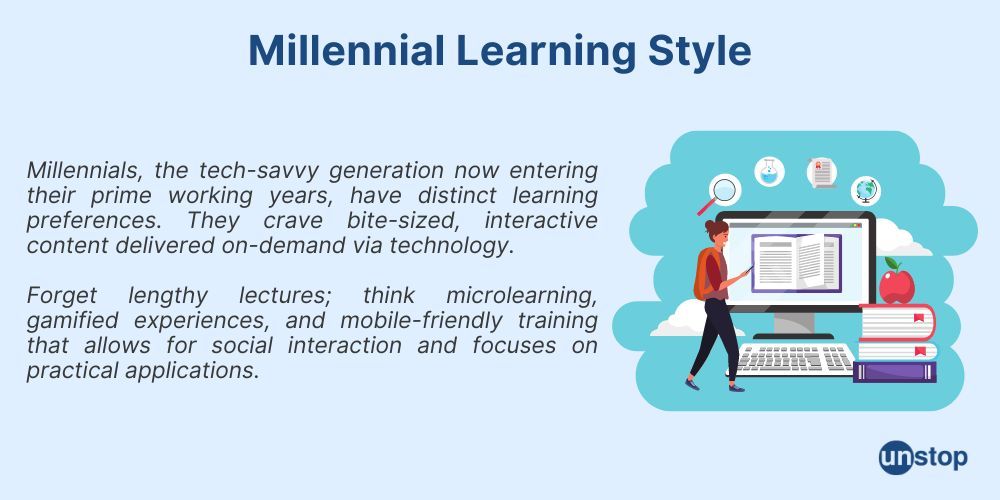
Millennials prefer interactive learning methods that engage them actively in the learning process. Utilizing digital platforms and interactive tools caters to their desire for hands-on experiences:
Online Courses & Webinars
Utilizing tools like online courses, webinars, and mobile apps can cater to their preference for interactive and on-the-go learning. Organizations can also tap into podcasts focused on leadership development.
Microlearning Techniques
Implementing microlearning modules can benefit millennials by breaking down complex information into bite-sized pieces, aligning with their short attention spans. These modules allow for flexibility in learning, fitting into their busy lifestyles.
Real-World Experiences
Integrating real-world experiences into leadership development programs can significantly benefit millennials. Hands-on learning allows them to apply theoretical knowledge to practical situations, enhancing their skill development.
Looking to develop millennial leaders? Explore a series of business simulations on Unstop that can help your workforce develop key skills.
Gamification Elements
Engaging millennials through gamified content can make learning more enjoyable and effective. Gamification elements, such as leaderboards and rewards systems, add an element of fun and competitiveness to the learning process.
Adapting Learning Strategies
Recognizing the need to adapt learning strategies is vital in nurturing millennial leaders. Regularly updating content based on Google Analytics data and feedback ensures that the programs remain relevant and impactful.
Benefits of Investing in Millennial Leaders
With Baby Boomers and Gen X exiting the modern workforce, developing millennial leaders is the need of the hour. However, it’s not just necessity that drives the development of millennial leadership. There are multiple benefits of investing in millennial leaders:
- Culture of Innovation: With their fresh perspectives and tech-savvy mindset, millennials enhance innovation within companies. Their creativity often leads to groundbreaking ideas and solutions.
- Employee Engagement: Investing in millennial leaders fosters a culture of engagement among employees. This results in higher morale, increased productivity, and a more positive work environment.
- Talent Pipeline: Developing millennials into leaders creates a stronger talent pipeline for future leadership roles. This much-needed succession planning ensures continuity in leadership positions and promotes long-term organizational success.
- Adaptability and Resilience: Millennial leaders bring a sense of adaptability and resilience to the table. They are quick to embrace change and navigate through challenges in today's rapidly evolving business landscape.
Closing Thoughts
Developing millennials into strong, capable leaders ensures long-term business growth and sustainability.
By investing in their leadership skills and providing mentorship opportunities, businesses can bridge generational differences and cultivate a dynamic leadership pipeline that drives innovation and success. The time to invest in the next generation of leaders is now!
Download the Unstop Talent Report 2024 and find insights on how the three stakeholders of hiring, students, colleges and recruiters, view the current hiring landscape.
Frequently Asked Questions
1. What are the key strategies for developing millennial leaders effectively?
Adapting development programs to match millennials' learning preferences and investing in tailored training programs that focus on and provide mentorship opportunities can significantly contribute to their growth as leaders.
2. How do millennials' learning preferences impact their development as leaders?
Millennials prefer interactive, technology-driven learning experiences that offer flexibility and immediate feedback. Incorporating these preferences into leadership development programs can enhance engagement, knowledge retention, and skill acquisition among Millennials, ultimately accelerating their growth as effective leaders.
3. What are the benefits of investing in millennial leaders for an organization?
Investing in millennial leaders cultivates a pipeline of future talent and boosts employee morale, engagement, and loyalty. Developing millennial leaders fosters innovation, drives organizational success, and positions the company as an attractive employer for top young professionals.
4. How can organizations develop millennials into future leaders?
Organizations can develop millennials into future leaders by providing opportunities for growth and development, offering mentorship and coaching programs, fostering a culture of continuous learning and feedback, and empowering millennials to take on leadership roles and responsibilities.
5. What skills are important for millennial leaders to develop?
Important skills for millennial leaders to develop include communication skills (both verbal and written), emotional intelligence, adaptability, problem-solving abilities, teamwork and collaboration, strategic thinking, decision-making, and resilience.
6. How can organizations leverage technology to support leadership development for millennials?
Organizations can leverage technology to support leadership development for millennials by providing access to online learning platforms, virtual leadership training programs, mobile apps for skill development, and digital tools for remote collaboration and communication.
7. What role does mentorship play in developing millennial leaders?
Mentorship plays a crucial role in developing millennial leaders by providing guidance, support, and advice from experienced leaders. A mentorship relationship can help millennials gain valuable insights, expand their network, and accelerate their leadership development.
Suggested Reads:
I’m a reader first and a writer second, constantly diving into the world of content. If I’m not writing or reading, I like watching movies and dreaming of a life by the beach.
Login to continue reading
And access exclusive content, personalized recommendations, and career-boosting opportunities.
Subscribe
to our newsletter
Blogs you need to hog!
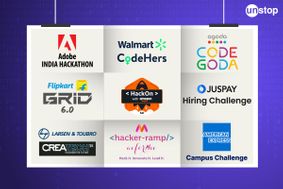
Organize Hackathons: The Ultimate Playbook With Past Case Studies

What is Campus Recruitment? How To Tap The Untapped Talent?
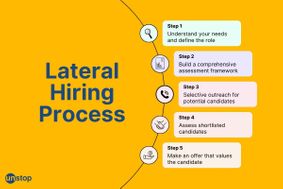
Lateral Hiring: A Complete Guide To The Process, Its Benefits, Challenges & Best Practices
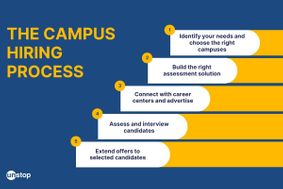










Comments
Add comment